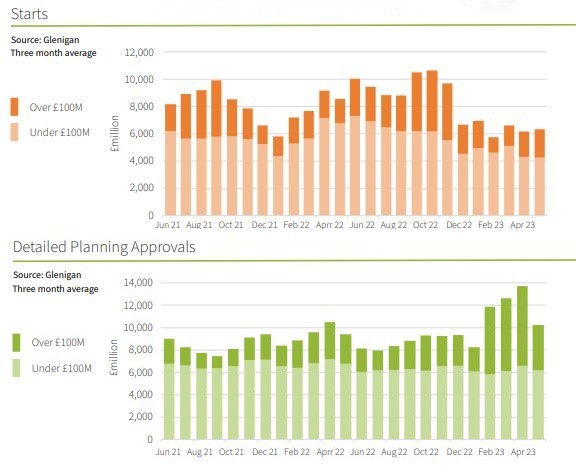Construction project-start performance up through Q.2

Glenigan has released the June 2023 edition of its Construction Review.
The Review focuses on the three months to thr end of May 2023, covering all major (>£100m) and underlying (<£100m) projects, with all underlying figures seasonally adjusted.
Sector-wide, the June Review shows mixed results. Construction-start performance stabilised during the three months to May, thanks largely to growth in major office, residential, and civil engineering projects, but remained down on last year as the industry continues to face difficult trading conditions.
Work commencing on-site increased by 10% against the preceding three months but stood 37% lower than a year ago. Main contract awards also faltered on the preceding three months’ performance, declining by a fifth in the three months to May to stand 37% lower than the same time last year.
On a more positive note, detailed planning approvals advanced on 2022 levels, increasing 9%, but fell back on the preceding quarter (-14%).
Commenting on the Review, Glenigan’s Economic Director, Allan Wilen says, “It’s unsurprising construction starts are continuing to decline compared to 2022 activity, which enjoyed an artificial boost as developers rushed to move building works to site ahead of tighter regulations coming into force. Here and now, there’s an unpleasant combination of economic stagnation, strangled supply chains, and double-digit inflation. The predicted, eye-watering interest rate increases will also have a deleterious effect, keeping construction on the back foot, especially in the private residential market which will suffer from soaring mortgage rates.
“Nevertheless, there’s a glimmer of light at the end of the tunnel. A modest lift in project-starts in the three months to the end of May, as well as planning approval increases, suggest a pipeline slowly filling with upcoming work, likely to buoy the industry in the longer term. Looking at sector verticals in more depth, whilst the overall picture was disappointing, a lift in industrial starts following a weak first quarter is encouraging, with the rising demand for logistics space expected to drive sector activity over the next few months.”
The sector-specific and regional Index, which specifically focuses on underlying project-starts, follows. Overall, the June Review paints a picture of general decline, with almost all sector verticals dropping against the preceding three-month period.
Sector Analysis – Residential
Residential starts-on-site fell back 10% during the three months to the end of May, to stand 46% lower than a year ago.
Private housing was down 13% against the preceding three-month period, with starts slashed in half (-55%) compared to 2022.
Likewise, social housing project-starts performance was weak, but fell less dramatically, dipping a modest 4% against the preceding three months to stand 1% down on last year’s figures.
Sector Analysis – Non-Residential
Industrial was the only sector to experience growth during the Review period, with project-starts increasing 9% during the three months to May but falling back 20% compared with the previous year.
Education performance was also mixed, faltering on the strong performance recorded in May’s Review. The value of project-starts declined 18% against the preceding three months, yet stood 9% up on 2022.
Retail fared particularly poorly, with the value of project-starts weakening against both the preceding three-month period and the previous year, declining 29% and 48%, respectively.
Health starts, having bounced back during Q.1, also tanked, dropping back 20% against the preceding three months to stand at half the value of last year (-52%).
Hotel & Leisure (-34%), and Community and Amenity (-54%) starts fell against the preceding three months, leaving them 10% and 54% down on the previous year, respectively.
Once again, civils performance slipped back, this time 30% lower than the preceding three months to stand 50% down on a year ago. This poor score was influenced by a marked decline in infrastructure starts, which dropped by 26% against the preceding three months to remain a staggering 56% down on the previous year. Utilities starts also declined by 35% against the preceding three months to stand 37% down against the previous year.
Regional Analysis
Regional performance was poor, with project-starts weakening across most areas of the UK during the three months to May.
The East of England was the only region to post growth on the preceding three-month period, with project-starts increasing 19%, but remaining 39% behind 2022 levels.
Wales suffered the heaviest fall, declining 56% against the preceding three months to stand 43% down on a year ago.
It was a similar story in Yorkshire & The Humber, with the value of project-starts decreasing 31% against the preceding three months and remaining significantly down (-52%) on the previous year.
Project-starts in the North East experienced a fall against both the preceding three months (-27%) and previous year (-26%).
London and the South West both weakened against the preceding three months, falling back 1% and 12%, respectively. Both regions were down on the previous year, remaining 20% and 46% lower than a year ago.
Scotland was also down on both the preceding three months (-12%) and the previous year (-43%).
Northern Ireland, the East Midlands, West Midlands, South East and the North West all crashed compared to both the preceding three months and previous year.







